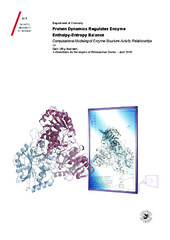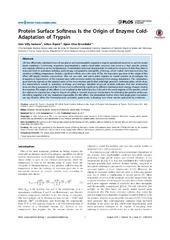| dc.contributor.advisor | Brandsdal, Bjørn Olav | |
| dc.contributor.author | Isaksen, Geir Villy | |
| dc.date.accessioned | 2015-10-02T11:57:06Z | |
| dc.date.available | 2015-10-02T11:57:06Z | |
| dc.date.issued | 2015-06-26 | |
| dc.description.abstract | Accurate predictions of free energies and the corresponding enthalpies and entropies from computer simulations are invaluable for understanding enzymatic catalysis and drug actions in terms of actual structure activity relationships. To facilitate the management and handling of the enormous amount of data generated when calculating thermodynamic parameters, we have developed a high-throughput interface (Qgui) for automated free energy and empirical valence bond calculations. We present simulations of cold- and warm-adapted trypsin that quantitatively capture experimental catalytic rates of the two enzymes and further yield high-precision Arrhenius plots, which show the characteristic trends in activation enthalpy and entropy. The relationship between these parameters and the 3D structure is reflected by significantly different internal protein energy changes during the reaction. The origin of this effect is not localized to the active site, but in the outer regions of the protein, where the cold-active enzyme has higher degree of softness. Stiffening the outermost loop regions in cold-adapted trypsin completely changes the enzyme from cold- to warm-adapted in terms of enthalpy and entropy. Several structural mechanisms for softening the protein surface in warm-adapted trypsin are also identified, together with key mutations responsible for this effect. The effect to the thermodynamic activation parameters induced by remote mutations was further investigated utilizing purine nucleoside phosphorylase (PNP). Here the exact reaction mechanism was not known, and it was thus necessary to resolve this first. The presented reaction mechanism reproduce experimental trends for both reaction rates and thermodynamic activation parameters in native and mutated PNP. Our calculations also show that the human PNP substrate specificity for 6-oxopurines over 6-aminopurines originates from significant differences in electrostatic preorganization. Both calculations on trypsin and PNP show that mutations distant to the active site alter the enthalpy-entropy balance without significantly changing the reaction rates. The enthalpy-entropy compensation induced by the mutations originates from altered protein surface softness. | en_US |
| dc.description.doctoraltype | ph.d. | en_US |
| dc.description.popularabstract | I doktoravhandlingen presenteres omfattende beregninger som blant annet viser hvordan evolusjonen har optimalisert enzymers temperaturavhengige virkeområde. Flere strukturelle mekanismer for finjustering av temperaturaktiviteten er identifisert sammen med spesifikke aminosyrer ansvarlig for denne effekten. De presenterte resultatene er basert på detaljerte energiberegninger av over 100 000 individuelle datasimuleringer. Det må presiseres at disse beregningene er svært omfattende og tidkrevende, noe som sannsynligvis forklarer hvorfor nesten ingen har gjort slike beregninger tidligere. For å muliggjøre dette har vi utviklet et dataprogram som ikke bare effektiviserer detaljerte energiberegninger for biologiske systemer, men også gjør det enklere for nye brukere å gjennomføre slike simuleringer. Forskningen har resultert i ny og viktig kunnskap om hvordan enzymer fungerer på molekylnivå, og er et viktig steg i retning av og potensielt kunne syntetisk designe biologiske katalysatorer. | en_US |
| dc.description.sponsorship | BioStruct | en_US |
| dc.description | Thesis I, III, IV and V are not available in Munin:
<br>I: Isaksen GV, Andberg TAH, Aqvist J & Brandsdal BO (2015) 'Q-GUI: A high-throughput interface for automated setup and analysis of free energy calculations and empirical valence bond simulations' (manuscript), published version available in <a href="http://dx.doi.org/10.1016/j.jmgm.2015.05.007">Journal of Molecular Graphics and Modelling, vol. 60, July 2015, 15-23</a>
<br>III: . Isaksen GV, Aqvist J, & Brandsdal BO (2015) 'Computational proof for protein surface softness regulating the enthalpy-entropy balance responsible for trypsin cold-Adaptaion', manuscript
<br>IV: Isaksen GV, Hopmann, KH., Aqvist, J, & Brandsdal BO (2015) 'Computer simulations reveals substrate specificity of glycosidic bond cleaveg in native and mutant Human Purine Nucleoside Phosphorylase', submitted manuscript
<br>V: Isaksen GV, Aqvist J, & Brandsdal BO (2015) 'Thermodynamics of glycosidic bond cleavage in human purine nucleoside phosphorylase reavealed with empirical valence bond free energy calculations', manuscript | en_US |
| dc.identifier.isbn | 978-82-8236-178-1 (trykt) og 978-82-8236-179-8 (pdf) | |
| dc.identifier.uri | https://hdl.handle.net/10037/8177 | |
| dc.identifier.urn | URN:NBN:no-uit_munin_7758 | |
| dc.language.iso | eng | en_US |
| dc.publisher | UiT Norges arktiske universitet | en_US |
| dc.publisher | UiT The Arctic University of Norway | en_US |
| dc.rights.accessRights | openAccess | |
| dc.rights.holder | Copyright 2015 The Author(s) | |
| dc.rights.uri | https://creativecommons.org/licenses/by-nc-sa/3.0 | en_US |
| dc.rights | Attribution-NonCommercial-ShareAlike 3.0 Unported (CC BY-NC-SA 3.0) | en_US |
| dc.subject | VDP::Mathematics and natural science: 400::Chemistry: 440::Theoretical chemistry, quantum chemistry: 444 | en_US |
| dc.subject | VDP::Matematikk og Naturvitenskap: 400::Kjemi: 440::Teoretisk kjemi, kvantekjemi: 444 | en_US |
| dc.subject | Molecular modeling | en_US |
| dc.subject | Empirical valence bond | en_US |
| dc.title | Protein Dynamics Regulates Enzyme Enthalpy-Entropy Balance | en_US |
| dc.type | Doctoral thesis | en_US |
| dc.type | Doktorgradsavhandling | en_US |


 English
English norsk
norsk

